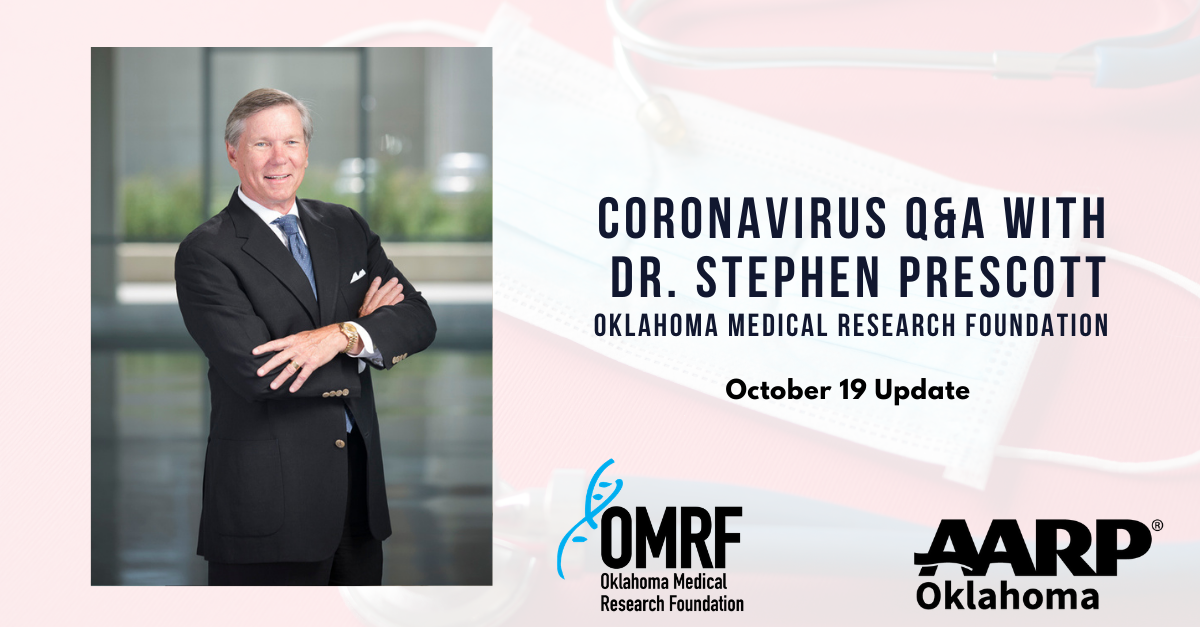AARP Hearing Center

Dr. Stephen Prescott, Oklahoma Medical Research Foundation president, answers your medical questions about coronavirus and COVID-19.
What is the G614 variant of coronavirus and what do I need to know about its impact on disease severity and symptoms?
It refers to a mutation, or change, in the genetic code of SARS-Cov-2, the virus that causes COVID-19. This is expected for a virus. At this point, this variation of SARS-Cov-2 has taken over and is the predominant strain worldwide. Statistically, we don’t see a lot of changes in severity, mortality or symptoms at this point. This is clouded by how much treatment and disease management has evolved since the virus first appeared. While mutations in the virus may prove to be scientifically and medically interesting, for all practical purposes, it changes nothing. Our approach has to remain the same: Wash your hands, wear a mask and practice physical distancing.
What are the similarities/differences of COVID-19 symptoms to influenza symptoms?
COVID-19 and the flu both are both respiratory illnesses. The symptoms are very similar: cough, sore throat, difficulty breathing, fatigue, runny nose, body aches and so on. Fever is often present in both, but not always. However, unlike the flu, COVID-19 can — but doesn’t always — cause a loss of taste or smell. If you suspect you have one or the other, you need to get tested for both. We don’t know yet if you could have both viruses at once, but so far, there’s no reason to think this can’t happen.
Are restaurants with outdoor seating safe?
Safety is relative. Outdoor seating where spacing is enforced is far safer than indoor seating, or crammed outdoor seating, but it’s not absolute safety. If you’re going to do it, windy days are better — even a light wind will help to quickly dilute the virus — and you want to have tables far apart. But even then, if you’re dining with people who you don’t share a home with, you should still try to keep a safe distance since you can’t eat with a mask on.
If you have tested positive for COVID-19 in the past, can you get it again?
The short answer is we don’t yet know to what extent reinfection can happen. Worldwide, there have been just a handful of confirmed reinfections. To confirm that someone has been infected twice, scientists look for differences in the genes of the two coronaviruses causing each illness. In the U.S., widespread testing wasn’t available early in the pandemic, so many people didn’t get tested unless they were very ill. Even then, samples weren’t typically preserved for analysis. That makes it challenging to confirm suspected reinfections.
Scientists around the world, including at the Oklahoma Medical Research Foundation, are studying our antibody response to the virus to try to better understand whether and how long we might be protected from reinfection. But for now, it’s safest to assume you can be infected twice.
What are some of the long-term or ongoing complications COVID-19 survivors are experiencing?
We’re seeing a lot of lingering effects in some COVID-19 survivors, the so-called ‘long-haulers’ who can’t quite get back to their pre-virus selves. Issues include problems with memory and cognition, chronic fatigue, and a general lack of endurance to complete basic tasks, like mowing the yard or taking out the trash. This phenomenon is appearing more in the 18-50 age range, and we have no idea how long these patients will experience it.
How does the experimental antibody cocktail Remdesivir impact COVID-19 symptoms?
Remdesivir is a traditional antiviral medicine designed to block replication of a virus. Studies show it could reduce the time you’re sick by a few days, which is good, but it’s not a cure. A worldwide study compared people who received the drug to those who didn’t, and unfortunately, not a lot of benefits were shown. With so many variations in treatment, it makes the data messy because it’s hard to know what’s doing what. But the takeaway is that Remdesivir is not a home run. Historically, we don’t conquer viruses with cures, we conquer them with vaccination.
Related articles:
Coronavirus Q&A with Dr. Stephen Prescott: September 24 Update
Coronavirus Q&A with Dr. Stephen Prescott: September 1 Update
Coronavirus Q&A with Dr. Stephen Prescott: August 24 Update
Coronavirus Q&A with Dr. Stephen Prescott: August 4 Update
Coronavirus Q&A with Dr. Stephen Prescott: July 24 Update
Coronavirus Q&A with Dr. Stephen Prescott: April 28 Update
Coronavirus Q&A with Dr. Stephen Prescott: April 9 Update
Coronavirus Q&A with Dr. Stephen Prescott: April 2 Update
Coronavirus Q&A with Dr. Stephen Prescott: March 26 Update
AARP and coronavirus
AARP has been working to promote the health and well-being of older Americans for more than 60 years. In the face of this pandemic, AARP is providing information and resources to help older people and those caring for them protect themselves from the virus and prevent it spreading to others. AARP is compiling facts and resources about coronavirus and how you can protect yourself. We’re updating this information as rapidly as we can to ensure our AARP members have the information they need at www.aarp.org/coronavirus.































































